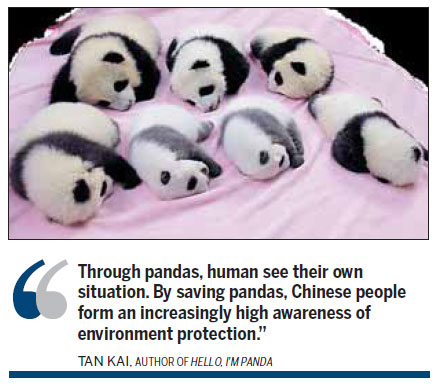From the panda's mouth
Updated: 2013-11-05 07:12
By Mei Jia (China Daily)
|
|||||||||||
Author Tan Kai, a panda enthusiast, has written poems and stories about the adorable animal. Mei Jia speaks to him about his latest book, which has a panda telling the stories of her clan from a first-person perspective.
If pandas could talk, will anybody resist listening to the cute creatures?
"Dear friends, nice to meet you. I'm Panda Nini. My face is round just like a fat doll wearing sunglasses. My appearance makes me look like a naughty simpleton, and even a little clumsy. My butt twists when I walk. It's so funny! Why are we all black and white?"
Nini is the storyteller in Hello, I'm Panda, who tells the stories of her clan in a new book by Sichuan Children's Publishing House. It will be launched in English in the coming months.
Tan Kai, the author, says he believes among numerous books introducing the creature, his work is unique because it could be the first time that a panda has taken the role of a first-person narrator.
"The first-person narration connects the readers with pandas instantly," Tan says, "making the readers feel for the pandas."
Yin Chuan, editor with the publisher, says the colorful book attracted huge interest from international publishers who visited their stands during the 2013 Frankfurt Book Fair in mid-October. More than 200 precious pictures add value to the book, she says.

They're either old pictures of high historic value or rare beautiful photographs provided by the Chengdu Research Base of Giant Panda Breeding, Yin says.
"Nothing has survived the long-term transformation of nature and history like the pandas, and that's why they are widely adored," Tan says.
Tan, born in 1943 in Sichuan province, makes a name as the Panda Writer for the numerous fiction and nonfiction works he has created in 33 years of tracking down the pandas' footprints with experts and research teams, covering all reserves in the province.
"I was there in many cases. Those experiences make my books on pandas like fresh dishes served hot, not the cold dishes that are reheated," says Tan metaphorically.
He is the executive editor of bilingual magazine Giant Panda, and took part in launching "Panda TV" on website ipanda.com.
Tan says he has written about almost all aspects of the pandas. But one day in the Chengdu research base when he was invited to stay in the cubs' nursery room, he witnessed how a mother panda took pains in taking care of her new-born baby.
"The mother's loving but tired eyes caught me," he says. The renewed affection inspired Tan to write a new book, emphasizing a mother panda's love.
"Hello, I'm a panda How warm and safe I feel in my mother's arms! But, mom has no time to rest Mom always tends to me as I cry. I know she wants me to be more comfortable Mom has not had anything to eat or drink for more than 10 days These are tired eyes, wanting to close at any time. But the power of love makes them remain open and hold on."
Tan explains the hardship of raising up a panda cub with "mom's melancholy eyes" and the love that "brought forth 8 million years of pandas' family history".
He goes on in the book to explain why and offers the latest discovery of scientific research on the giant pandas.
"Mother pandas find it hard to take care of the kids because usually they are 1,000 times heavier than their children in weight," Tan says.
"The smallest panda cub is about 51 grams. With an under-developed mouth, it can only be fed with drops of milk from a needle," he adds.
One paper published in 2011 discloses more information, Tan says.
"They found out that though pandas' pregnancy takes about 120 to 170 days, it's only in the last month that the fertilized ovum is embedded," he says.
Another less known fact about pandas that Tan includes in the book is pandas are pigeon-toed in both of their two pairs of limbs, so "they walk in clumsy style with twisted hips".
Drawn to observe and write about the pandas from the early 1980s, Tan sees humanity behind the panda stories.
"I'm deeply impressed by the panda's international appeal, and how fragile the species is," he says. "Without large human input, pandas are still endangered."
"Through pandas, human see their own situation. By saving pandas, Chinese people form an increasingly high awareness of environment protection," he says.
According to Xinhua News Agency, about 1,600 giant pandas live in the wild, mostly in the mountains of Sichuan province, while more than 300 live in captivity.
Tan has also penned poems about pandas, delivering the pandas stories with a poet's sharpness and passion.
"Tan Kai is able to see through the social phenomenon to understand the profound truth. He understands human emotions and has great storytelling skills," comments Liu Shahe, Sichuan's iconic writer.
Tan is excited to tell the story of one British man called David Turner.
Turner formed a special preference for pandas in the 1940s when London was under Nazi blitz.
Then a panda named Ming was in the zoo. While other animals were frightened and scattered by the bombs, Ming remained composed and ate and slept as usual. Ming was later pictured as the embodiment of British people "with high morale" in the anti-fascism war.
Some 60 years later, suffering a brain tumor, Turner was only able to learn things about pandas from the newspaper his wife read to him.
In 2003, with his doctor's permission, he got a chance to travel to Chengdu to see real pandas.
"That day all the young pandas in the base were let out and played freely with Turner.
Surrounded by the fluffy black and white creatures, he kept on pinching his face to make sure it wasn't a dream," Tan says.
"Turner said that day was the happiest day in his life," Tan says.
Contact the writer at meijia@chinadaily.com.cn.
|
A newly published English-language book, Hello, I'm Panda, reveals many little-known details of this rare animal. Photos Provided to China Daily |
(China Daily 11/05/2013 page22)
Today's Top News
Experts advise caution over Winter Olympics bid
Expats disobeying courts to be barred from leaving
Pollution 'to ease in five to 10 years'
Report highlights smog effects
Factories going green, efficient
Govt to focus on better service
Luxury shoppers get more sophisticated
Li urges farmers to plant more in 2014
Hot Topics
Lunar probe , China growth forecasts, Emission rules get tougher, China seen through 'colored lens', International board,
Editor's Picks

|

|

|

|

|

|






